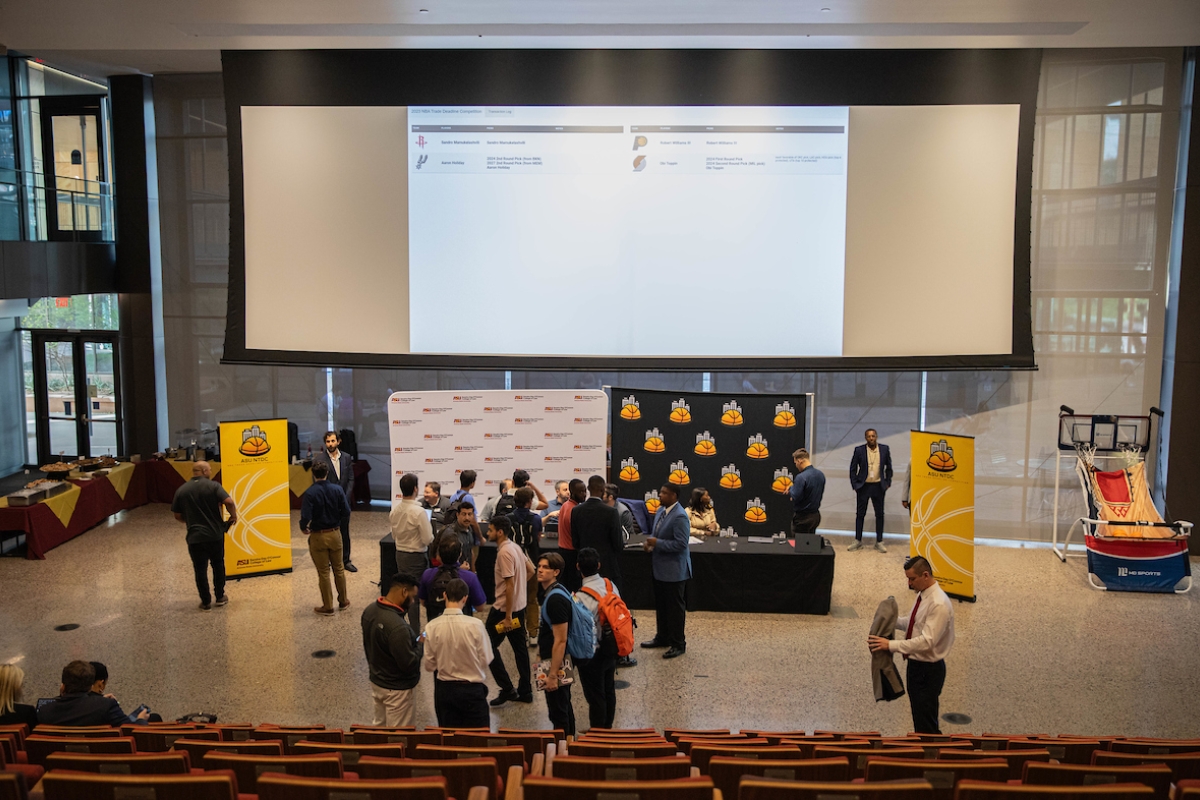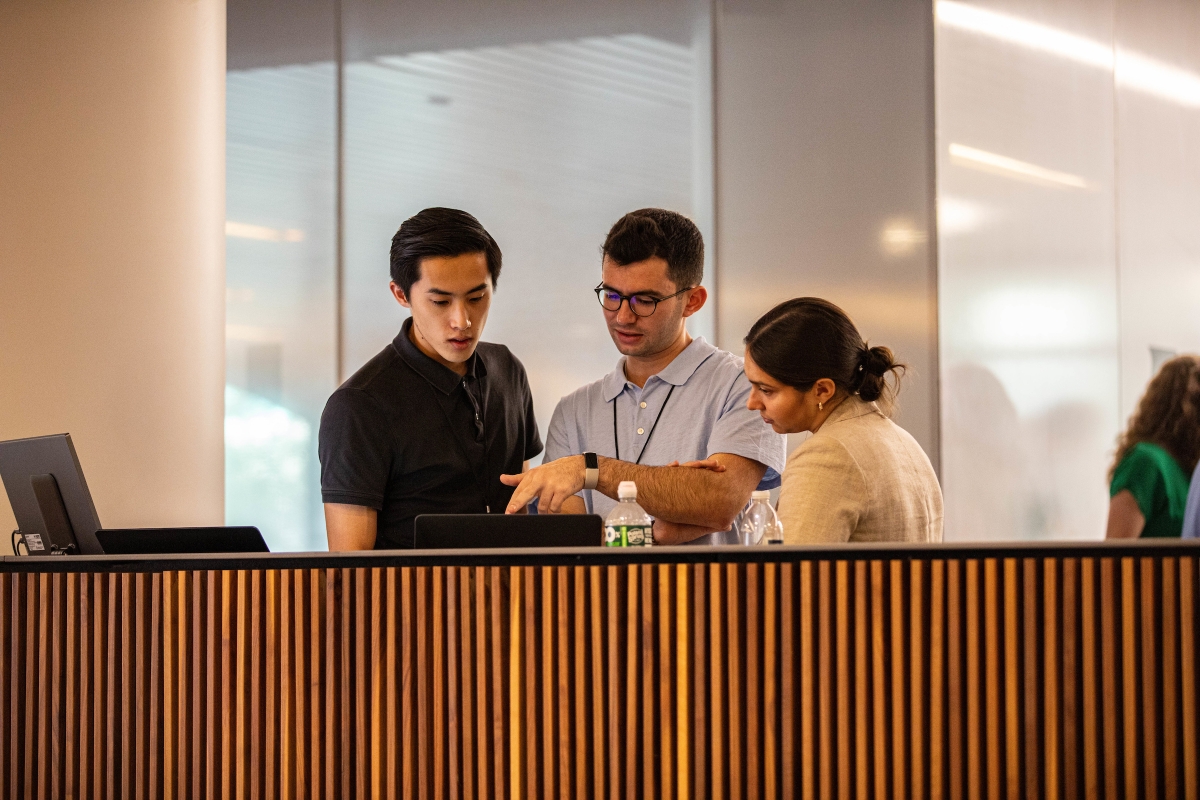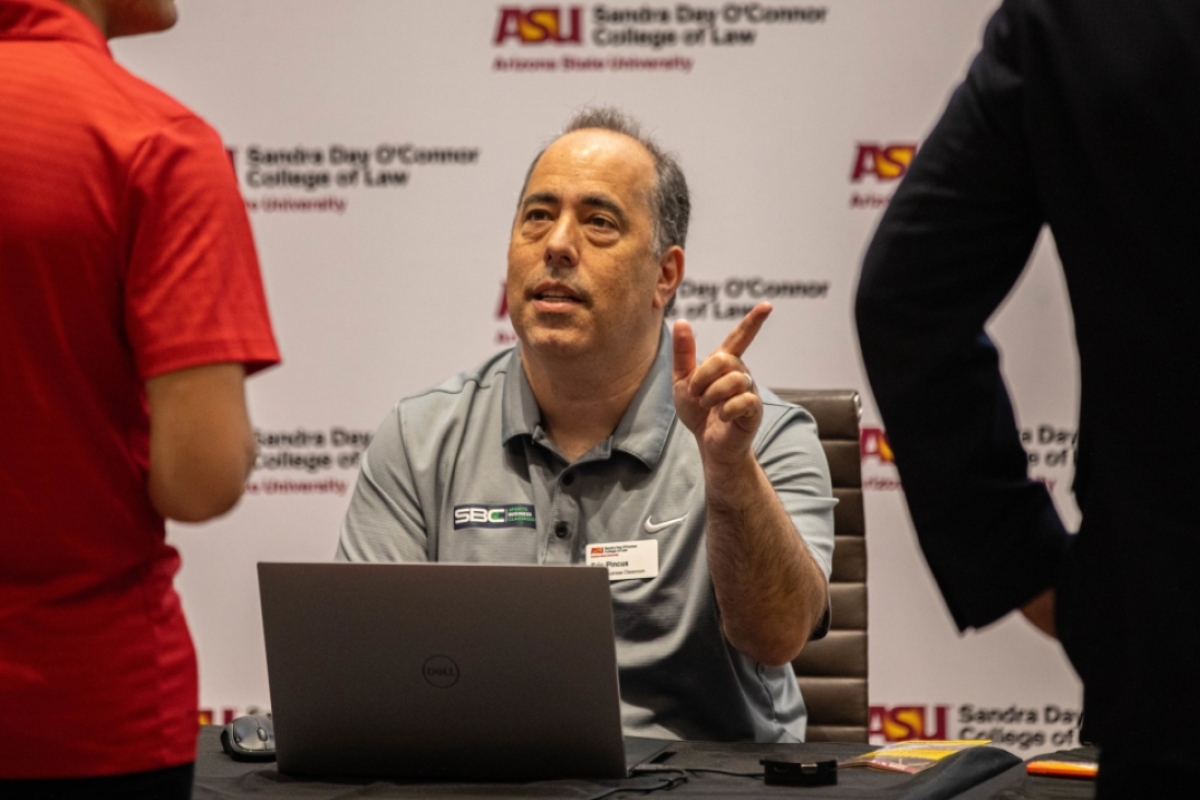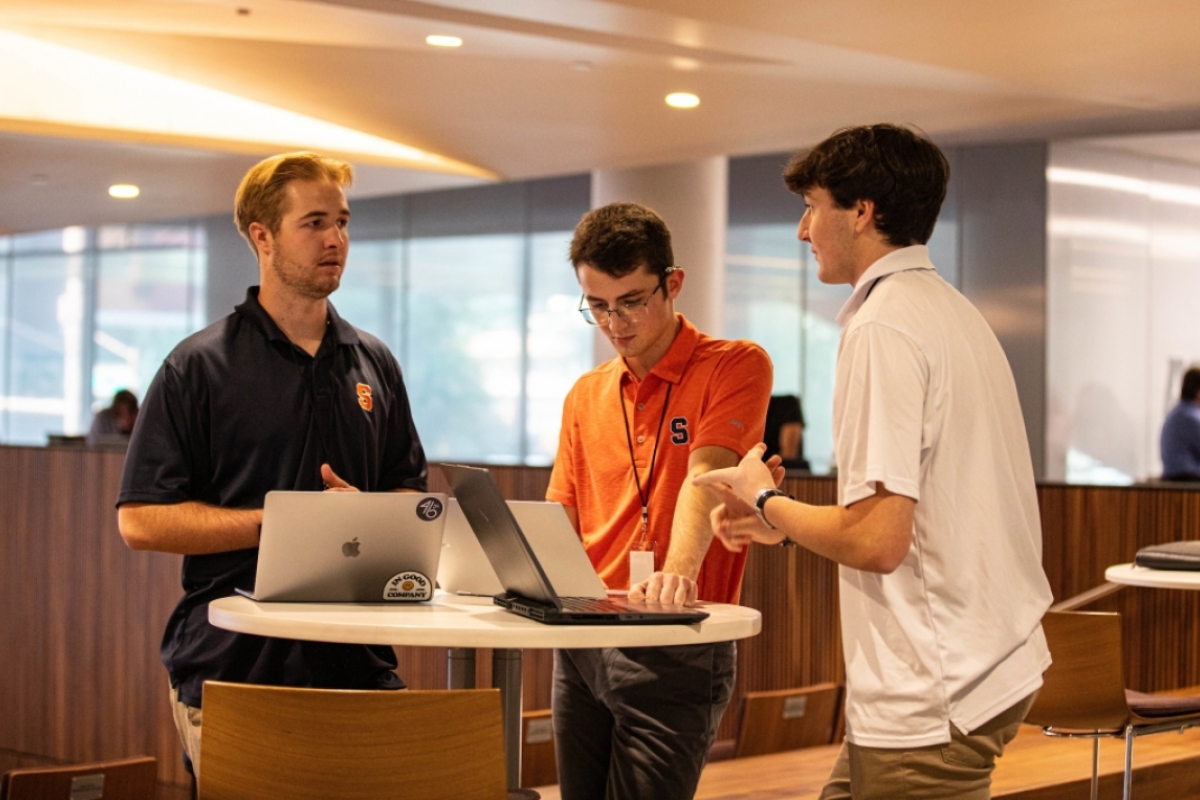To deal or not to deal: ASU hosts mock NBA trade competition
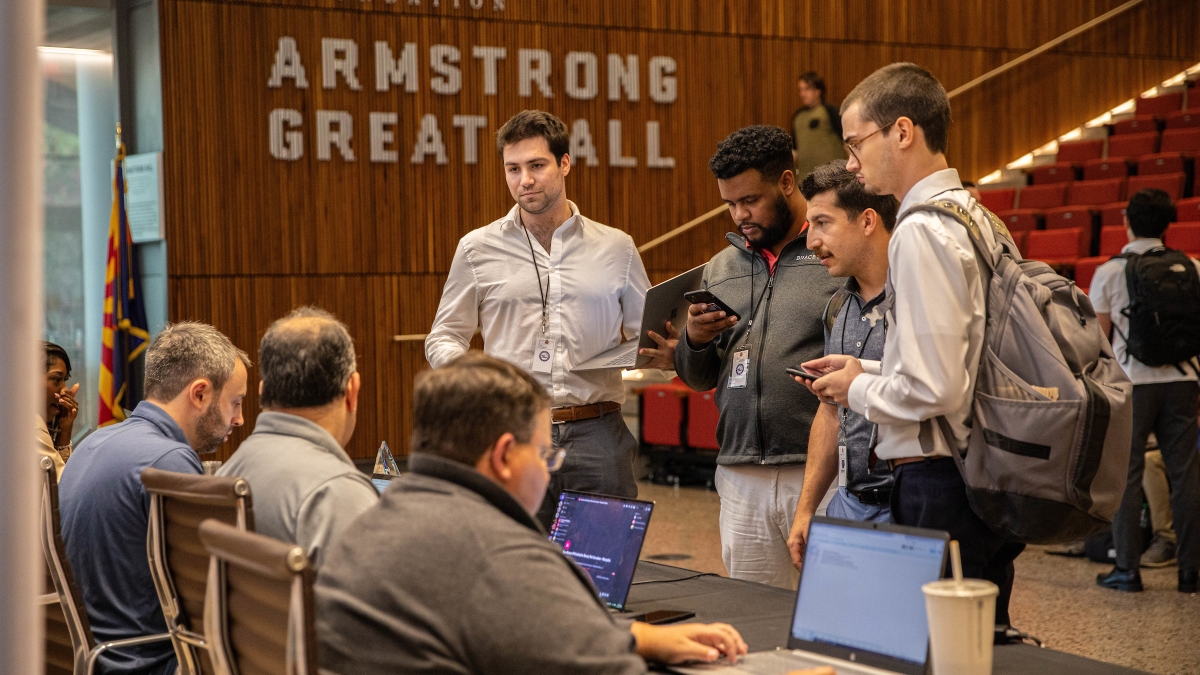
Participants (from left to right) Ryan Mayhan, Joey Novielli, Ben Brown and Patrick Carnahan converse with judges during the Mock NBA Trade Deadline Competition on Nov. 3 at the ASU Sandra Day O’Connor College of Law in downtown Phoenix. Photo by Paula Soria/Arizona State University
Editor’s note: This story is featured in the 2023 year in review.
Five hours remain until the NBA’s trade deadline, and executives in the Phoenix Suns front office were desperately trying to deal guard Bradley Beal.
Dumping Beal isn’t at all what the Suns envisioned when they acquired him in the offseason, but Phoenix is 26-24, in seventh place in the Western Conference standings, and Beal and forward Kevin Durant have missed a combined 30 of the team’s 50 games.
Phoenix would love to trade Beal for Minnesota big man Karl Anthony Towns, a close friend of guard Devin Booker. But there are complications: Beal has a no-trade clause, meaning he would have to approve any trade, and the deal would have to work within the NBA’s confusing and complicated salary cap rules.
The Suns’ brain trust begins to communicate with other teams via Discord, an instant messaging app. They understand the odds are against them dealing Beal, given his salary — he’s in the second year of a five-year, $251 million deal — and his injury history.
But they’re hopeful a title contender will see Beal as the missing piece, and Beal will approve of the potential trade that’s brought to him.
What’s that, you say? The NBA season just began, and the trade deadline isn’t until Feb. 8?
Not if you were one of more than 125 students from 35 collegiate programs and more than 20 states across the country taking part in the inaugural Mock NBA Trade Deadline Competition hosted by Arizona State University’s Sandra Day O’Connor College of Law.
The event, conceived and organized by third-year ASU Law student Kyle Goodier, was designed to give students (sort of) real-life experience as NBA front office executives and allow them to make contacts with officials from around the league, an invaluable resource as they begin their careers.
“I found that it’s really, really difficult to get front office-related experience, and there’s not really an education system in place to enable students to kind of develop those skills and showcase those skills to (NBA) employers,” said Goodier, who estimated he spent 2,500 hours planning the event over an 18-month period.
Goodier had a model for what he wanted to do. He attended the 2021 Business of Basketball Immersive experience put on by Sports Business Classroom during the NBA’s Summer League in Las Vegas, where he met dozens of NBA executives.
He asked Stacy Leeds, Willard H. Pedrick Dean of the Sandra Day O'Connor College of Law, if a similar event could be held at the school’s Downtown Phoenix campus. Leeds gave the thumbs up, and Goodier began getting the word out to students at ASU and other universities and schools via social media, signing up sponsors and securing the participation of NBA executives like Jesse Held, director of basketball information and research for the Suns, and Dave Lewin, assistant general manager for the Boston Celtics, as well as Eric Pincus, an NBA salary cap expert and instructor at Sports Business Classroom.
Here’s how the event worked: Three-to-six-person student teams became front office executives for 29 of the 30 NBA teams — the San Antonio Spurs didn’t have student representation. Each team had a pre-assigned record — thus the Suns’ dismal mark — in order for the student executives to know whether they should be buyers or sellers at the trade deadline.
After the five-hour trading period, the student teams explained why they made the deals they did — or why they didn’t make any deals — in presentations to 16 judges, all of whom are NBA front-office executives. The judges then graded those presentations and named team winners of the competition.
“We’re looking to see if they’ve thought through the decision, understand the pros and cons of the risks, are comfortable this is the right decision and can back it up,” Pincus said. “In similar competitions I’ve voted for teams that made a move I personally wouldn’t do, but in the moment, and the way they justified it, made a lot of sense.”
Held called the competition an “incredible opportunity” for students.
“Not only to somewhat learn what a front office executive does during the trading deadline, but to make connections with people in the league,” Held said. “It’s an incredibly competitive industry to try and get into. Anytime jobs are posted, we get inundated with applications. So if you have something that you can point to that says, ‘I did this (the mock trade deadline competition),’ it certainly helps.”
Held said the willingness of students to fly to Tempe to participate in the event also will impress potential future employers.
“I don’t think you make the commitment to fly across the country unless it’s something that you are truly passionate about,” he said. “And finding qualified candidates who are incredibly passionate about the work is always what every team is looking for.”
The experience of being a general manager for a day — and the connections they were able to make — were why Alex Burns, a senior majoring in sports management at the University of Wisconsin-La Crosse, and Blake Stern, a junior majoring in sports management at the University of Wyoming, took part in the competition. Burns and Stern, along with ASU second-year law student Zach Anne, were part of the Charlotte Hornets front office.
“I’d love to eventually work my way up to being a GM, and I think this is a great opportunity to meet judges who are working in the industry as well as fellow competitors who are interested in the industry,” Anne said. “You’re also gaining a lot of experience in kind of a simulated environment of how hectic it is, how you need to know the NBA salary cap and be able to talk to scouts. It’s a lot of fun.”
Stern, who hopes to work in the NBA, said the ability to network with league executives was a huge draw.
“It’s definitely worth the travel,” he said. “The contacts we make can be so valuable.”
The competition can be a proving ground, as well. Pincus said two students whose teams were named winners in the Sports Business Classroom mock deadline events now have jobs with the San Antonio Spurs and Indiana Pacers.
"It's not always the students who come in first, second or third who get jobs, but there can be a correlation," Pincus said.
In the end, after five hours of conversations, the Suns’ contingent didn’t trade Beal, instead making a series of minor trades. The Lakers’ front office, comprised of five students from the Freeman School of Business at Tulane University, won the competition.
And while it was a mock exercise, the benefits of the event were very real.
“Ultimately, this helps everyone because the students get to work with one another, understand a little bit about all the aspects that go into a front office and get to function as sort of a makeshift front office in person,” Goodier said. “It’s just a really cool opportunity to network and learn a lot.”
More Law, journalism and politics
Can elections results be counted quickly yet reliably?
Election results that are released as quickly as the public demands but are reliable enough to earn wide acceptance may not always be possible.At least that's what a bipartisan panel of elections…
Spring break trip to Hawaiʻi provides insight into Indigenous law
A group of Arizona State University law students spent a week in Hawaiʻi for spring break. And while they did take in some of the sites, sounds and tastes of the tropical destination, the trip…

LA journalists and officials gather to connect and salute fire coverage
Recognition of Los Angeles-area media coverage of the region’s January wildfires was the primary message as hundreds gathered at ASU California Center Broadway for an annual convening of journalists…


